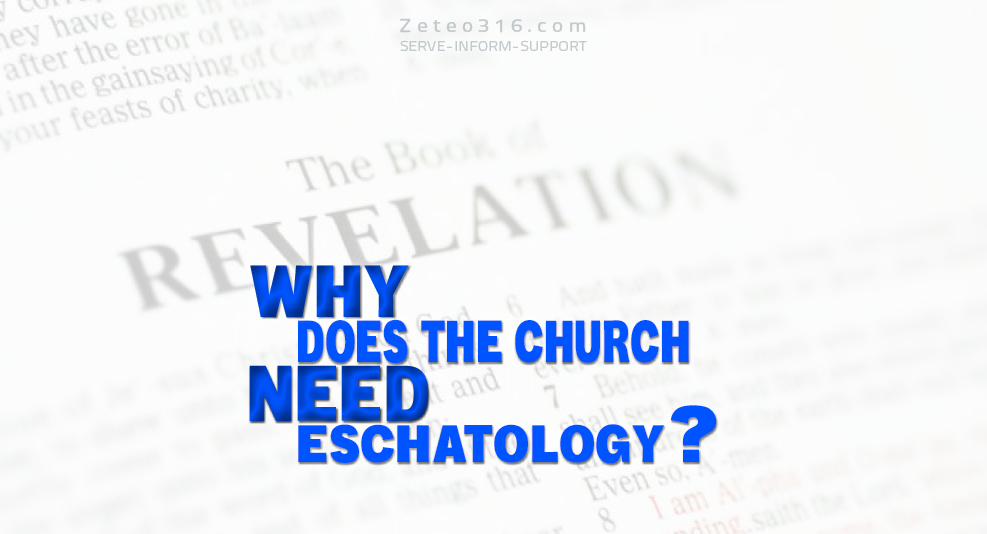This question was posed in a recent article by Michael Vlach from The master’s Seminary. I’ll be riding on his coat tails for much of this column, and adding my own thoughts to his. In other words I’m stealing his ideas.
I’ve mentioned once before that my introduction to eschatology occurred at around age six while attending a Catholic school class. The sky suddenly turned dark and it rained harder than I had ever seen before. I seem to recall feeling apprehensive.
An older girl informed us that this was the end of the world and that Jesus was coming. Perhaps she was only trying to calm us. She was my first failed prognosticator. But she did sew in me an interest and longing in the Lord’s return. For that I’m grateful.
Looking forward to Christ’s return is comforting. That’s one good reason right there!
Michael Vlach lists seven great reasons why the church should take eschatology seriously. Following are his reasons (listed), clumsily paraphrased by me. (I highly recommend reading his article for the full gist and the links at the end):
Seven Great Reasons:
1) Eschatology is a major part of the Christian story line
This should be a no brainer. Vlach lists examples like the rapture; the Day of the Lord; the Second Coming; the Millennium, and the Eternal State as important future events which the Bible addresses. To that I would add God’s plan for Israel, the Gentiles and the Kingdom. See Dr Vlach’s book He will Reign Forever.
2) We are called to preach and heed the whole counsel of God
This is connected to the first reason. If Scripture consistently addresses future events which are to occur, then we should attend to them. Passages such as Ezekiel 36–48, the Thessalonians materials and Revelation are futuristic (even though many deny this). Vlach notes that:
“If your church does not teach what the Bible says about the future, the whole counsel of God is not being taught.”
3) People are interested in the future
If they’re not, they should be! Some people live day to day, not concerned about the future. When I was a New Ager, the message was “to live in the moment.” Again, the Bible says a lot about our future. It’s important to address where we may spend eternity.
4) Eschatology is a motivation for believers
We ought to be motivated by eschatology. Vlach cites Paul’s message to Timothy in 2 Tim 4:7-8. Paul was motivated to live and run his race by what was promised to him, and for all who love the Lord’s appearing.
5) Eschatology has a purifying effect on the believer
Here Dr. Vlach cites one of my favorite passages, 1 John 3:2-3. We should live in a manner befitting of someone who expects the Lord’s imminent return (James 5:8-9). But even if the Lord doesn’t return in our day, death will overtake us, sometimes suddenly.
6) Eschatology gives perspective to the troubles and trials of this age
We live in a fallen world. Sometimes our trials and our tribulations seem to overwhelm us: financial concerns, health issues, deaths of loved ones, persecution etc. All these things will pass away. Christians can look forward to the resurrection in a glorified body and eternal joy in the new heavens and earth.
For I consider that the sufferings of this present time are not worthy to be compared with the glory that is to be revealed to us. Rom 8:18
7) Eschatology warns the unbeliever of coming judgment
I don’t really need to say much about this because it should be self explanatory. To their peril, however, many wolves posing as shepherds in the church, deny God’s righteous wrath (Luke 3:7; James 3:1).
From His mouth comes a sharp sword, so that with it He may strike down the nations, and He will rule them with a rod of iron; and He treads the wine press of the fierce wrath of God, the Almighty Rev 19:15
Now for some personal thoughts:
Eschatology can be a two-edged sword because of the differing views. It raises passionate exchanges even in cases where people generally ignore it. Some are strongly against certain dispensational teachings. The pretrib rapture and Israel are two areas of strong contention.
I’ve seen comments over the years by people who are looking for churches teaching eschatological views they’ve embraced. Prewrathers will seek a prewrath teaching church, while pretribbers prefer a pretrib church, and so on.
What if you find yourself in a church which is biblically sound in the fundamentals of the faith and nurtures the sheep, yet emphasizes an eschatology you disagree with? What if it seeks to convert you to its way of thinking? These might be challenging situations.
I’m fortunate to attend a church where the lead pastor focuses on Christology, the Triune God and the gospel. Whenever eschatology is mentioned, the congregation is encouraged to do its own homework. That suits me just fine.
During a Q & A session with a group of theologians holding to different views on eschatology in churches, John MacArthur made an interesting comment. He said that Grace Community Church prefers the phrase “What We Teach” rather than “What We Believe.” His reasoning was that the congregation has members with differing eschatological viewpoints.
In reality, of course, what that church teaches is what it believes, even though some members will disagree. And that concept is further paramount to all the “fundamentals of the gospel” being taught. But I appreciate what he intends.
John MacArthur, Steven Lawson, R. C. Sproul, Albert Mohler, Sinclair Ferguson, Ligon Duncan and others will disagree in areas of eschatology. Yet they regularly unite in commitment to the gospel and defense of the faith.
The church needs eschatology, however it needs unity in Christ most of all. Let us not divide over it. We can all agree that we will share a glorious eternity with the Lord Jesus Christ.
Maranatha!

